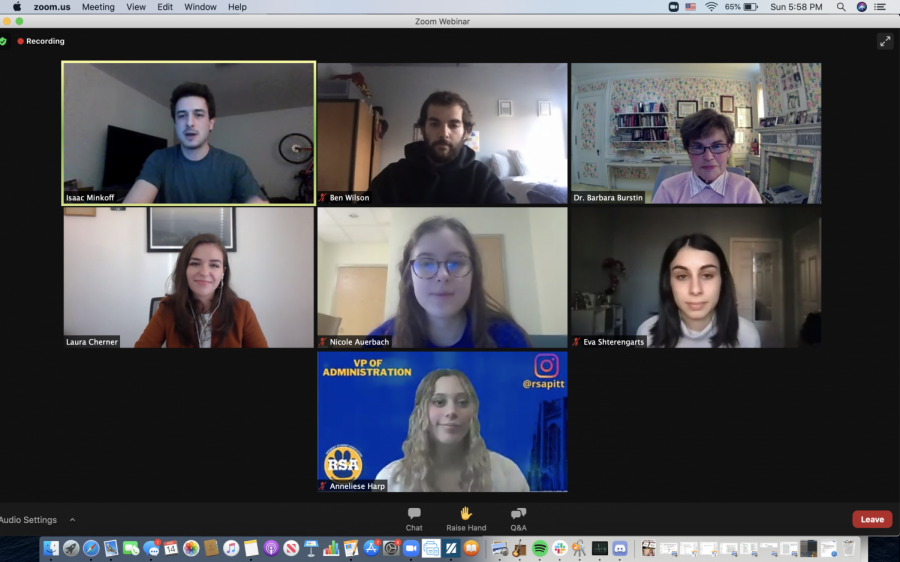Hillel and RSA team up in anti-Semitism town hall
Pitt Hillel and Resident Student Association hosted the first of a four-part town hall series Sunday evening, with this week’s conversation revolving around a Q&A session with local Jewish activists.
March 15, 2021
Anneliese Harp, the vice president of administration of Pitt’s Resident Student Association, said RSA has teamed up with Hillel to bring light to relevant social issues such as anti-Semitism.
“RSA serves as a representative body within the University to identify and make known the needs of resident students. This is why we decided to create the town hall series,” Harp, a sophomore pre-pharmacy student, said. “Within the last year, we have started to acknowledge more injustices that are being done and are systematically rooted in our society.”
RSA hosted the first of the four-part town hall series Sunday evening alongside Hillel. About 60 people joined local Jewish activists for a Q&A session that focused on historical and modern anti-Semitism. People could submit their questions before the panel, or through a chat feature during the Zoom call.
Laura Cherner, director of senior relations council at the Jewish Federation of Greater Pittsburgh and Dr. Barbara Burstin, a professor in the history department at Pitt, detailed the history of anti-Semitism.
Burstin said the phrase “the longest hatred” has been used to describe anti-Semitism to illustrate the depth and length of anti-Semitic ideology. Burstin said it is difficult for students to understand the depth of anti-Semitism, because it was not taught following the Holocaust.
“In the post-Holocaust era, there has been a dramatic revision of Christian teaching. In this era, Jews were hated, denigrated, blamed, scapegoated for anything that was wrong,” Burstin said. “Often, hatred is generational, where these strokes that are passed on through families, through society, even if general messaging has changed, the deep-rooted hatred can remain.”
Cherner said 2020 and 2021 have brought new forms of anti-Semitism, with instances of things like Zoom-bombing. She said Zoom events held by the Jewish Federation of Pittsburgh and its Holocaust Center experienced several instances of infiltration by anti-Semites who screamed profanity and anti-Semitic tropes and threatened violence in order to intimidate the participants.
Cherner said Jewish people were also the center of many COVID-19 conspiracy theories in the past year, such as ones stating that the Jewish community is behind the coronavirus and is using it as a tool to expand global influence and derive profit. The American Jewish Committee said linking Jewish people to diseases is not a new phenomenon, as people in medieval times blamed Jewish people for the spread of the plague.
“Jews are also sometimes blamed for COVID. People think that the Jewish community brought it in to kill non-Jews, or that Jews are poisoning vaccines to kill non-Jews, just crazy conspiracy theories that still exist,” Cherner said.
The conversation also focused on anti-Zionism, which Cherner defines as “an opposition to Jewish people living in and having a state in the State of Israel.”
Cherner said anti-Zionism differs from anti-Semitism and that it’s important to make that distinction between the two terms.
“Anti-Zionism becomes anti-Semitism when you take it to a place of perpetuating anti-Semitic tropes, or advocating for the eradication of Israel,” Cherner said. “Most Jews that I know are critical of Israel, and some are incredibly critical of Israel, without going to the place of saying that Israel should not exist at all.”
Burstin said students should be aware of the way in which they consume their news. With the rise of social media, she said it is easy to fall prey to misinformation.
“One of the concerns today is the impact of social media and the fact that a lot of people get their information from sound bites. And you know there’s a lot of things said out there that aren’t true, that are misleading, that are incendiary, and I’m more and more concerned where you get your information and how you process it and whether that information is really giving you the right ideas,” Burstin said.
Burstin said students who want to be allies to Jewish people should educate themselves, either through formal classes or informally, by inviting speakers to clubs to which the students belong.
“Take a class. Take a class on any kind of Jewish history. Think of something, if you don’t want to take a formal class, invite a speaker. If you’re in a sorority or some group, invite a speaker who can come and talk to you and be in a dialogue. Invite someone from the Hillel Jewish University Center to come and talk to you,” Burstin said.
Cherner said a way to combat anti-Semitism is making friends with Jewish people on campus, as well as using the resources available for college students.
“Go out of your comfort zone and make friends with Jewish peers and support them in ways that you would support a friend,” Cherner said. “There are a lot of resources out there — a lot of books, materials, Dr. Burstin’s classes — there’s a lot you can do. College is a great opportunity to do that, and it’s all about learning and it’s all about engaging.”








